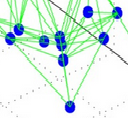Bio Inspired Routing Methodologies for Wireless Sensor Networks
A wide range of routing protocols have been proposed for wireless sensor networks, based on traditional performance metrics which aim to maximise throughput, minimise and balance energy consumption and delay. Their ability to adapt the routing priorities in response to changing environmental conditions (e.g. rapidly varying traffic demands, changing connectivity, varying node energy levels) remains quite limited. Millions of years of evolution has yielded many biological systems and processes with have intrinsically appealing characteristics such as adaptivity to varying environmental conditions, inherent resiliency to failures and damages, successful and collaborative operation on the basis of a limited set of rules and with global intelligence which is larger than superposition of individuals, self-organization, survivability, and evolvability.
Inspired by these characteristics, this research project is exploring how the behaviours of biological systems can be applied to the multi-hop routing problem in wireless sensor and ad hoc networks. Novel routing methodologies are being developed through simulation in MATLAB, based on dynamic topology management achieve through the use of mobile nodes. Analytical models will also be developed as a means of validation. Comparisons will be drawn with conventional approaches to routing, including standard protocols running across static networks such as AODV.

Members
- Jenny Michel Fawzy
- Paul Mitchell
Dates
- Start: October 2012
Research
